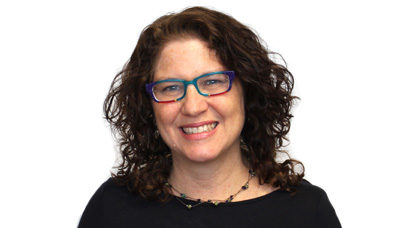In 2009, Rabbi Stephanie Kolin lobbied at the Massachusetts State House for transgender rights. In her testimony, she shared that she had led a trip to Israel and described the reaction of one of the participants when they arrived at the Kotel, which includes separate sections for men and women:
He said through his tears, ‘I don’t know what to do.’ And, gesturing to the right side of the Kotel, he said: ‘I don’t belong over there,’ and gesturing to the left side, the men’s side, he said: ‘and no one wants me over there.’ And he cried some more and he told me that all he wanted to do was approach what was sacred to his people, to be part of his community, to be counted among the people. He went on to say that he felt this pain every time he wanted to do something as simple as use a public bathroom. (qtd. in Keshet blog)
I hear an ancient echo of this man’s pain in the chilling story found at the end of Parashat Emor. A man described as the son of an Israelite woman and an Egyptian man fights with an “Israelite” man, and he blasphemes the Name of God and curses. Following some legal uncertainty, Moses hears the Divine decision and announces that in punishment for his blasphemy, the man is to be brought outside the camp, “and all who heard him will lay their hands upon his head, and the entire community will stone him.” (Leviticus 24:10-14).
A story of a public stoning is horrifying not only to us today; our sages expressed their discomfort through literary midrashim in which they imagined back stories that may have led to this shocking outcome. Rashi brings one story in his commentary:
He came to pitch his tent within the camp of the tribe of Dan. They said to him: “What right do you have to be here?” He said to them, “I am from the Danites.” They said to him: “It is written ‘Each person shall pitch his tent by his flag, with the symbols of their father’s house’ (Bamidbar 2:2).”
One camped with one’s tribe, and since the tribe was determined by the father, the man found himself without a home. Through no fault of his own, just an honest desire to find a place to pitch his tent and live amongst family and community, he was rejected and told he did not belong. He pleaded his case in Moses’ court, and when Moses decided against him, the man committed the act of blasphemy.
Even without midrash, the Torah calls forth unease when reading this story. The people who witnessed and heard the man’s blasphemous speech are to “lay their hands on his head.” This brings to mind the Yom Kippur ritual of the High Priest, who places his hands on the head of a goat and confesses the sins of the people (Leviticus 16:21). Through this literary connection, we are meant to recognize the role the people played in this tragedy. In the Book of Job, Job’s wife advises her suffering husband to curse God and die (Job 2:9). The act of blasphemy is spoken of as, effectively, a form of suicide. The Torah seems to be acknowledging the responsibility the community bears for rejecting a person whose identity did not fall neatly into one category, and for their role in causing him to blaspheme and bring his own life to an end.
In the intimate act of surrounding the man and laying hands upon him, it’s almost as if God is asking the people to do what they had not previously done when this man sought their fellowship – come close to him, reach out their hands, and see him. They are, perhaps, being asked to make a different choice. And yet in the end, the Torah records that they did not even make this gesture – “And they took the blasphemer outside the camp and pelted him with stones….” (Leviticus 24:23). They became an ugly mob that violently acted out against someone they have deemed “other,” thereby erasing him from their community.
Kids today are learning to harass their peers and police their bathroom usage as young as the age of four, as related in Ivan Coyote’s 2015 TED Talk. We need to be better than this. From making sure our schools are safe environments so all children can thrive to making all of our public places safe for transgender and nonbinary adults, we should use all the tools we can so individuals can put less energy into using a bathroom or changing room, filling out forms, or going through airport security and focus instead on all the other challenges and blessings of life.
Parashat Emor and our sages’ literary interpretations help us to see the anxiety and violence that may come from coercing people to fit into fixed binary understandings of the world. Let’s imagine a better future where those who do not fit into either/or boxes will be embraced and appreciated as each of us longs to be.
Rabbi Tracy Nathan is Senior Educator with the Center for Jewish Learning at Jewish Federation of St. Louis.

